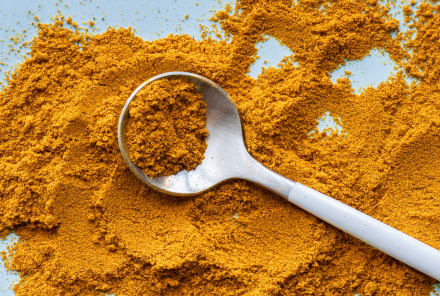Advertisement
Are Maca Root's Benefits Science-Backed? A Deep Dive Into The Ancient Plant Medicine

Maca has been consumed for thousands of years for its purported mood, fertility, and sexual health benefits. Today, some research findings suggest maca may help those with low sex drive, fertility issues, and mood disorders. But is this root truly the plant powerhouse it's promoted to be, or are its benefits way overhyped?
Here's what you need to know about maca root, including a rundown of its potential health benefits, safety, and side effects.
The need-to-knows:
- It's often taken as a mood and sexual health supplement: The maca plant contains unique bioactives, and people often take it to improve mood, energy, and sexual health.
- Evidence on it is limited and most of its benefits are not backed by science: Most of the research findings on maca's health benefits have been mixed, with some studies finding no significant benefits or unclear effects.
- Maca has a rich history: Maca has been used as a natural medicine in the Peruvian Andes for at least 3,000 years. The cultural significance of the plant should be respected—even if some of its uses haven't been validated by modern science.
What is maca root?
Also called Peruvian Ginseng and Ginseng Andin, Lepidium meyenii belongs to the Brassica plant family, which also includes broccoli, radishes, and arugula. There are different types of maca, and the roots can range in color from black to pink.
In Peru, maca has been used as a food and natural medicine for at least 3,000 years. The cooked root can be made into dishes like mashes, while maca flour is used to make baked goods, like breads and cakes. It's also used as a traditional medicine to treat conditions such as fertility challenges and respiratory disorders2.
Though maca has been a staple food and medicine in Peru for thousands of years, it's only recently become popular in the U.S. Over the past couple of decades, the demand for maca has skyrocketed as more people become interested in natural remedies for low libido and fertility challenges.
Following this increased public demand, scientific interest in maca root has picked up. The number of scientific publications focusing on maca increased by 550%3 over one decade, from 35 papers in 2010 to 228 in 2020.
While maca root can be used as a food source, it's mostly consumed as a supplement in the U.S. It's usually consumed as a powder but can also be found in capsules and gummies. Maca powder has a nutty, slightly butterscotch-like taste.
As for how it's usually used, "Maca root powder can be safely incorporated into a person's diet by adding it to foods and drinks, like baked goods and smoothies," herbalist Grace Yoon tells mindbodygreen.
Summary
Maca root benefits
Maca root contains a variety of bioactive compounds4 that are unique to the plant, including macaenes, macamides, macaridine, and maca alkaloids. It also contains sterols, glucosinolates, fiber, amino acids, vitamins, and minerals.
Though maca's mechanisms aren't fully understood, it's thought that these plant compounds act on certain pathways, hormones, and systems in the body, such as the central nervous system, resulting in health improvements.
For example, maca may modulate levels of certain hormones in women, such as follicle-stimulating hormone (FSH) and luteinizing hormone (LH), which could help improve certain symptoms, such as low sex drive, in some populations.
Here's more on the potential health benefits of maca, and how much research there is to support them:
It may help improve mood & energy levels
Limited evidence suggests that supplementing with maca may help improve energy levels.
A 2016 study published in Pharmaceuticals that included 175 people found that daily supplementation with 3 grams of red or black maca extract per day for 12 weeks led to improvements in mood, energy, and overall health status5 scores compared to a placebo group.
Additionally, results from a few studies suggest that maca may improve symptoms of depression. For example, a small 2015 study of 29 postmenopausal Chinese women found that when the women took 3.3 grams of maca for six weeks, they experienced significant decreases in depressive symptoms6 compared to a placebo treatment.
It may help with male fertility challenges (but we need more research to be sure)
One of the most common reasons people supplement with maca is to improve fertility.
While research is limited, some studies have found that maca may help improve certain aspects of male fertility, such as sperm concentration, or the number of sperm per milliliter of semen. Low sperm concentration is a significant factor in male fertility challenges.
A 2020 study published in Andrologia that included 69 men diagnosed with mildly low sperm count and/or reduced sperm motility found that the participants who supplemented with 2 grams of maca per day for 12 weeks experienced significant improvements in sperm concentration7 compared to the placebo group.
However, other studies8 have found that maca supplementation has no benefit on markers of fertility challenges, including sperm concentration. Due to inconsistent study findings, it's currently unclear if maca has any significant benefit for this issue.
Some small studies show that it can boost sex drive in men and women
Maca is often added to supplements and natural products that are marketed as libido enhancers, and some studies suggest that taking it may rev up sex drive in men and women.
For example, a 2022 review of 10 studies9 investigating the effects of supplements on antidepressant-induced sexual dysfunctions (AISD)—or sexual issues caused by some antidepressants, like selective serotonin reuptake inhibitors (SSRI)—found that high doses of maca providing around 3 grams per day may be effective for improving AISD.
Additionally, the 2016 study5 mentioned above found that daily supplementation with 3 grams of red or black maca per day for 12 weeks increased the perception of sexual desire from week one to week 12 compared to placebo, with a more pronounced effect in the red maca group.
While maca may improve sex drive in certain populations, most of the studies investigating maca's impact on sexual health are older studies with small sample sizes.
It may ease the symptoms of low testosterone
Hypogonadism10, commonly referred to as low testosterone, is when testosterone levels fall below 300 nanograms per deciliter (ng/dL).
Though hypogonadism can be treated with hormone replacement, some men (like those with prostate cancer or sleep issues) can't take testosterone replacement and require alternative treatment methods.
A 2023 study that included 80 men with hypogonadism demonstrated that the participants who took 3 grams of maca per day for 12 weeks experienced significant improvements in hypogonadism-related symptoms11, such as low sex drive, erectile dysfunction, and fatigue, compared to the placebo group. However, it's important to note that although maca improved symptoms related to low testosterone, the treatment did not increase serum testosterone levels.
Although these results are promising, the researchers noted that more research is needed to fully understand how maca can improve the health of men with hypogonadism.
In addition to the potential benefits listed above, maca has also been linked to improvements in inflammatory markers12, blood pressure6, and other health parameters in certain populations. However, research on these potential effects is limited.
Summary
How to add it to your routine
Maca root is usually taken in powdered form and added to drinks, like smoothies and protein shakes. Some people use maca powder to make hot drinks like lattes and hot chocolate, too. Maca powder can also be mixed into foods like oatmeal, yogurt, and homemade energy balls. It has a butterscotch-like flavor, so it pairs well with sweet ingredients like fruit and cocoa.
Most research studies investigating the safety and health effects of maca have used supplements providing doses of maca between 1.5 and 3 grams per day for six to 16 weeks. Supplements providing up to 3 grams of maca per day are considered safe and well tolerated when taken for up to four months.
Maca can be taken in single or divided doses. In most research studies, maca treatments were given in divided doses with meals.
Even though most of the studies on the safety of maca have been small in size, maca interventions seem to be well tolerated1 and have not been linked with serious side effects or safety concerns.
Buying tips
Like any supplement, it's important to purchase high-quality maca products from trusted companies whenever possible.
Because maca has become so popular, there have been a few reports13 of companies using cheaper ingredients, such as turnip, radish, potato, and corn powder, in supplements advertised as containing 100% maca. However, even though maca supplement adulteration has been reported in the past, specifically from supplement manufacturers in China, the adulteration of maca supplements isn't widespread.
That said, it's always best to purchase maca products from companies that use third-party labs to test their supplements for safety and purity.
Other perspectives on maca root
While maca has been linked to several health benefits, and scientific interest in maca has grown significantly over the past decade, it's not considered a well-studied product.
Supplement manufacturers sometimes exaggerate the health benefits of maca, claiming that it can improve multiple aspects of health, from fertility to sex drive. Even though maca has been shown to improve certain health parameters in some populations, most of the research findings on maca's health benefits have been mixed, with some studies finding no significant benefits or unclear effects.
For example, although maca is often taken by people hoping to improve their fertility, a 2022 review8 reported that the included study findings showed that maca had mixed efficacy in improving sperm concentration and sperm motility and that maca didn't seem to be effective in increasing sperm concentration compared to placebo treatments.
Although this doesn't mean that maca isn't at all effective for improving fertility markers, the researchers were clear that more rigorous research needs to be completed before maca can be recommended as a natural fertility treatment.
The mindbodygreen POV
Though it's clear that maca supplements do have the potential to positively impact some aspects of mood and sexual health, more research is needed to fully understand its mechanism of action and efficacy. Most of the research studies investigating the health effects of maca have been small in size. Plus, scientists aren't exactly sure how the compounds found in maca work in the body.
Those hoping to improve aspects of health that maca is commonly reported to help with, such as fertility challenges or low sex drive, should speak with their health care provider to discuss potential causes and more evidence-based treatments.
That said, eating up to 3 grams of maca daily appears to be safe. So if you like the taste of maca, have a cultural connection to the maca plant, or simply enjoy having it as part of your routine, there is little harm in consuming it—and you may personally find benefit from it.
Maca root has a rich history, and there's a reason it's been a prized plant in South America for thousands of years. Even if it isn't a science-backed treatment for issues like low testosterone, that doesn't mean consuming it daily won't benefit some people. The science just isn't strong enough to support using it as your sole treatment plan.
Side effects
Maca is considered safe and hasn't been linked to serious side effects. Some studies have reported mild adverse reactions, including insomnia, altered menstrual cycles, cramps, and insomnia. However, maca is usually well tolerated when taken in recommended doses.
"While maca root is generally safe for most people, there are a few potential side effects associated with maca, such as digestive issues like bloating or upset stomach," says Yoon.
When first taking maca, Yoon recommends starting slow. "It's always best to start with a small amount and gradually increase as needed," she says. This way, you can see how you tolerate maca and note any side effects or symptoms that may arise.
It's unknown if maca has the potential to interact with medications. Because maca has been shown to reduce blood pressure, people on blood pressure medications like losartan shouldn't take maca unless they clear it with a health care provider first.
Because the safety of maca hasn't been studied in pregnant or breastfeeding women, these populations should also avoid using maca supplements. Scientists are still studying how maca interacts with certain hormones, so people with estrogen-sensitive conditions, such as breast cancer, ovarian cancer, uterine cancer, endometriosis, or uterine fibroids, should avoid using maca too.
FAQ
What does maca root do for women?
Some studies have found that maca may help improve low libido, decrease blood pressure, and decrease depressive symptoms in some women. However, evidence is limited at this time. The science is not strong enough to support using maca as your sole treatment plan.
What happens if I take maca root every day?
Maca is safe to take daily in doses of less than 3 grams. Studies show that taking up to 3 grams of maca per day for 16 weeks is safe and not associated with significant side effects.
Does maca increase testosterone?
Though maca has been shown to improve symptoms related to low testosterone, maca doesn't seem to impact testosterone levels in humans.
The takeaway
Maca is a popular supplement that's promoted as a natural way to boost sex drive, improve fertility, and enhance energy levels. However, evidence of its efficacy is limited. Although maca is considered safe and is usually well tolerated, it's best to check with your health care provider before taking it. Those with diagnosed low testosterone or low sex drive may also want to inquire about more evidence-based treatments to take instead of (or in addition to) maca. If more energy is what you're after, here are a few other supplements that can combat sleepiness.
13 Sources
- https://www.ncbi.nlm.nih.gov/books/NBK548552/
- https://pubmed.ncbi.nlm.nih.gov/28811221/
- https://www.sciencedirect.com/science/article/abs/pii/S0731708521001746
- https://www.sciencedirect.com/science/article/abs/pii/S0031942221002120
- https://pubmed.ncbi.nlm.nih.gov/27548190/
- https://pubmed.ncbi.nlm.nih.gov/24931003/
- https://pubmed.ncbi.nlm.nih.gov/32654242/
- https://www.ncbi.nlm.nih.gov/pmc/articles/PMC9468664/
- https://www.ncbi.nlm.nih.gov/pmc/articles/PMC9332380/
- https://pubmed.ncbi.nlm.nih.gov/30422528/
- https://www.ncbi.nlm.nih.gov/pmc/articles/PMC10307657/
- https://www.ncbi.nlm.nih.gov/pmc/articles/PMC10097151/
- https://www.ncbi.nlm.nih.gov/pmc/articles/PMC5542917/
Watch Next
Enjoy some of our favorite clips from classes
Enjoy some of our favorite clips from classes
What Is Meditation?
Mindfulness/Spirituality | Light Watkins
Box Breathing
Mindfulness/Spirituality | Gwen Dittmar
What Breathwork Can Address
Mindfulness/Spirituality | Gwen Dittmar
The 8 Limbs of Yoga - What is Asana?
Yoga | Caley Alyssa
Two Standing Postures to Open Up Tight Hips
Yoga | Caley Alyssa
How Plants Can Optimize Athletic Performance
Nutrition | Rich Roll
What to Eat Before a Workout
Nutrition | Rich Roll
How Ayurveda Helps Us Navigate Modern Life
Nutrition | Sahara Rose
Messages About Love & Relationships
Love & Relationships | Esther Perel
Love Languages
Love & Relationships | Esther Perel
What Is Meditation?
Box Breathing
What Breathwork Can Address
The 8 Limbs of Yoga - What is Asana?
Two Standing Postures to Open Up Tight Hips
How Plants Can Optimize Athletic Performance
What to Eat Before a Workout
How Ayurveda Helps Us Navigate Modern Life
Messages About Love & Relationships
Love Languages
Advertisement

A Harvard Study Just Linked 4 Diets To Longevity: Here's What They Are
Gretchen Lidicker, M.S.

A Harvard Study Just Linked 4 Diets To Longevity: Here's What They Are
Gretchen Lidicker, M.S.

A Harvard Study Just Linked 4 Diets To Longevity: Here's What They Are
Gretchen Lidicker, M.S.

A Harvard Study Just Linked 4 Diets To Longevity: Here's What They Are
Gretchen Lidicker, M.S.









